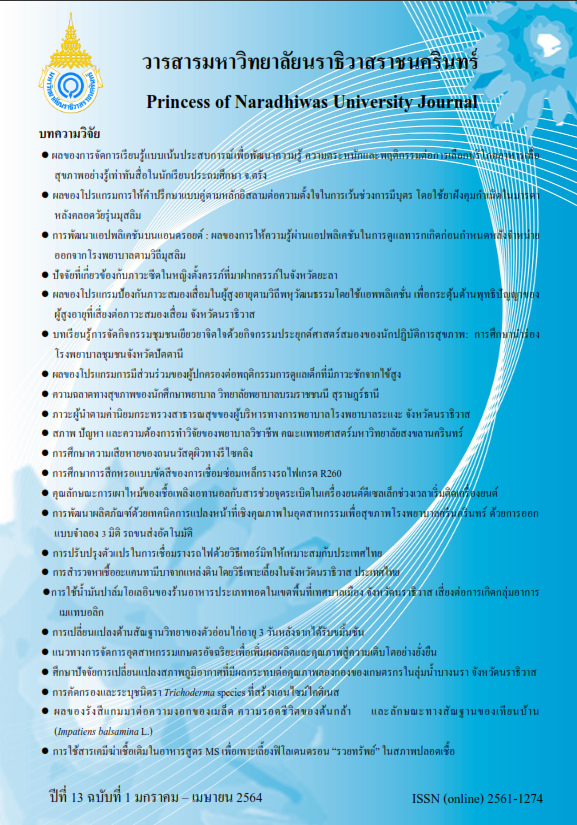ผลของโปรแกรมการมีส่วนร่วมของผู้ปกครองต่อพฤติกรรมการดูแลเด็กที่มีภาวะชักจากไข้สูง
คำสำคัญ:
ผู้ปกครอง, โปรแกรมการมีส่วนร่วม, การดูแลเด็กที่มีภาวะชักจากไข้สูงบทคัดย่อ
การวิจัยกึ่งทดลองนี้ มีวัตถุประสงค์เพื่อเปรียบเทียบคะแนนพฤติกรรมการดูแลเด็กที่มีภาวะชักจากไข้สูง ระหว่างกลุ่มที่ได้รับโปรแกรมการมีส่วนร่วมของผู้ปกครองกับกลุ่มที่ได้รับการพยาบาลปกติ กลุ่มตัวอย่างเป็นผู้ปกครองของเด็กที่ได้รับการวินิจฉัยว่ามีภาวะชักจากไข้สูงเข้ารับการรักษาในหอผู้ป่วยกุมารเวชกรรม 1 โรงพยาบาลตรัง เดือนมกราคม - กรกฎาคม พ.ศ. 2562 จำนวน 60 ราย โดยเลือกกลุ่มตัวอย่างแบบเฉพาะเจาะจง แบ่งเป็นกลุ่มควบคุม 30 ราย และกลุ่มทดลอง 30 ราย โดยจับคู่แบบ match paired กลุ่มทดลองได้รับโปรแกรมการมีส่วนร่วมของผู้ปกครอง กลุ่มควบคุมได้รับการพยาบาลตามปกติ เครื่องมือที่ใช้ในการเก็บรวบรวมข้อมูล ได้แก่ โปรแกรมการมีส่วนร่วมของผู้ปกครอง แบบสอบถามข้อมูลทั่วไปของผู้ปกครอง และแบบสอบถามพฤติกรรมการดูแลเด็กที่มีภาวะชักจากไข้สูง ผ่านการตรวจสอบความตรงตามเนื้อหาจากผู้ทรงคุณวุฒิจำนวน 3 คน มีค่าดัชนีความตรงตามเนื้อหาเท่ากับ 0.92 และหาความเชื่อมั่น โดยใช้สูตรสัมประสิทธิ์แอลฟาของครอนบาค มีค่าเท่ากับ 0.84 สถิติที่ใช้ในเคราะห์ข้อมูล คือ ร้อยละ ค่าเฉลี่ย ส่วนเบี่ยงเบนมาตรฐาน และสถิติทดสอบที (t-test)
ผลการวิจัยพบว่า กลุ่มทดลองที่ได้รับโปรแกรมการมีส่วนร่วมของผู้ปกครองมี คะแนนพฤติกรรมการดูแลเด็กที่มีภาวะชักจากไข้สูง ภายหลังได้รับโปรแกรมฯ (x = 96.77, S.D. = 2.144) สูงกว่าก่อนได้รับโปรแกรมฯ (x = 55.07, S.D. = 1.285) อย่างมีนัยสำคัญทางสถิติ (t (29) = -92. 113, p < .001) และคะแนนพฤติกรรมการดูแลเด็กที่มีภาวะชักจากไข้สูง ภายหลังเข้าร่วมโปรแกรมการมีส่วนร่วมของผู้ปกครอง (x = 41.70, S.D. = 2.480) มีคะแนนสูงกว่ากลุ่มที่ได้รับการพยาบาลตามปกติ (x = 39.87, SD = 2.751) อย่างมีนัยสำคัญทางสถิติ (t (58) = 2.711, p < .05 ) จากผลการวิจัยมีข้อเสนอแนะว่า โปรแกรมการมีส่วนร่วมของผู้ปกครอง ช่วยส่งเสริมให้ผู้ปกครองมีความรู้ ความเข้าใจ เสริมทักษะในการดูแล และสร้างความมั่นใจในการดูแลเด็กที่มีภาวะชักจากไข้สูงได้อย่างมีประสิทธิภาพ สามารถป้องกันการกลับเป็นซ้ำได้
เอกสารอ้างอิง
Aissarachot, N, Napapansakul, M., & Panmatharit, B. (2014). The Effect of a Maternal Participation in Child Care Program on Maternal Stressor at a Pediatric Intensive Care Unit. The 3 rd Annual PSU Phuket International Conference 746-758.
Ball, J.W, & Bindler, R.C. (2008). Pediatric nursing: Caring for children (4 th ed). New Jersey: pearson Prentice Hall.
Chantawattana, B., Dilok Sakulchai, F., Sukcharoen, B., Loetthamathevi, W., & Muksiksukon, S. (2009). Children Nursing Book 2. Bangkok:Pre One Partnership. (in Thai).
Charoensatsiri, R. (2018). Behaviors of Parents in Caring for children with Febrile Convulsion. Journal of Prapokklao Hosp Clin Med Educat Center, 35(1), 40-46.
Elizabeth, S.H., Gordon, B.G., Harbaugh, N., McInerny, T.K., Miller, M.R., Moyer, V.A., et al. (2008). Febrile seizures: clinical practice guideline for the long-term management of the child with simple febrile seizures. Pediatrics, 121(6), 1281 - 1286.
Hauser, W.A. (1994). The prevalence and incidence of convulsive disorders in children. Epilepsia, 35 Suppl 2, S 1-6.
Kuntahong, S. (2018). The Nurses’ Roles: Promotion of Parental Self-efficacy in Caring for Children with Acute Illness. Journal of Nurses Association of Thailand Northern Region, 24(2), 50-60.
Laohasaran, S., Visudtiphan, A., Khongkhathum, C., Thampratankul, L., Chiemchanya, S., & Visudhiphan, P. (2011). Clinical and electroencephalographic characteristics of children presenting with febrile seizures. Paper presented at the 71th Annual Pediatric Conference of The Royal College of Pediatricians of Thailand, Chonburi. (In Thai)
Nilon, B., Pongjaturawit, Y., & Chaimongkol, N. (2014). Effect of the Maternal Participation Promoting program on Ability to Care for Children with Febrile Convulsion. The Journal of Faculty of Nursing Burapha University, 22(3), 29-41.
Samit, J., Lamchang, S., & Mesukko, J. (2013). Informational Support, Self-efficacy and Parent Participation in Caring for Hospitalized Children with Acute Illness. Nursing Journal, 40(4), 114-125.
Schepp, K. (1995). Psychometric assessment of the preferred participation scale for parent ofhospitalized children. Unpublished manuscript: University of Washington, School of Nursing, Seattle, WA.
Sugai, K. (2010). Current management of febrile seizures in Japan: an overview. Brain Dev, 32(1), 64-70.
Tourabouth, M., Lamchang, S., & Aree, P. (2013). Maternal Participation in Caring for Hospitalized Children with Acute Illness, Lao People’s Democratic Republic and Related Factors. Nursing Journal, 40(1), 102-114.
Yuychim, P., Niratharadorn, M., Siriumpunkul, P., & Buaboon, N. (2018). Effects of a Family Participation Program in Managing Drug Managing Drug Use Behaviors among Older Adults with Chronic Disease in Phun Phin Community. Journal of Public Health, 48(1), 44-56.




